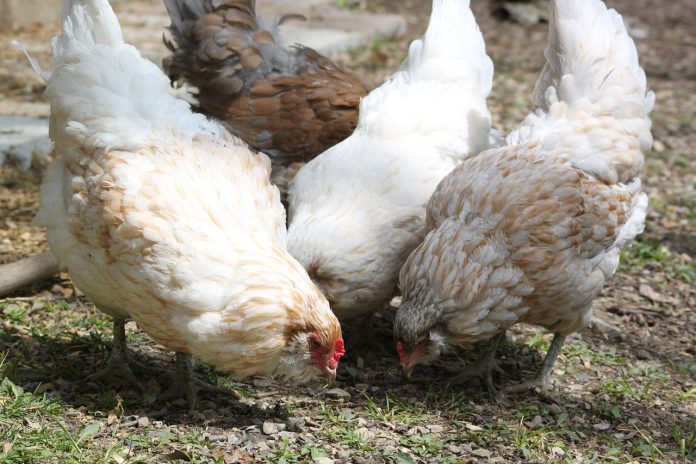Highly pathogenic avian influenza has been appearing in wild birds and commercial poultry throughout the East Coast and Midwest. It can cause severe disease and high mortality in infected poultry. Certain virus strains can affect multiple internal organs with mortality up to 90% to 100% in chickens, according to Centers for Disease Control data.
The USDA Animal and Plant Health Inspection Service provides up-to-date information about the detection of avian influenza in commercial and backyard flocks, as well as, detections in wild birds.
Highly pathogenic avian influenza is rapidly fatal for poultry, so the best way to protect domestic flocks is by being mindful and using biosecurity.
What types of poultry are affected?
- Chickens
- Turkeys
- Pheasants
- Quail
- Ducks
- Geese
The sudden onset of highly pathogenic avian influenza and high death rates are common in chickens, turkeys, pheasants and quail.
Symptoms range from one poultry species to the next. Detecting highly pathogenic avian influenza early is crucial to limit its spread.
Early signs of highly pathogenic avian influenza in chickens include signs of depression and ruffled feathers in egg layers. Next, they experience respiratory distress and extreme diarrhea, followed by rapid death. They may also experience swelling around the head, neck and eyes, and have purple discoloration on their heads and legs.
Other poultry species can experience tremors, twisted necks, paralyzed wings and laying down. Turkeys typically appear quiet and depressed, lay down more and have swelling around their eyes. Ducks and geese are more resistant and generally have a lower instance of symptoms and death, but they can carry the virus and spread it to other birds.
Protecting your flock
Protecting your flock during an outbreak of highly pathogenic avian influenza can be done by isolating your flock, keeping your poultry housing clean and avoiding the accidental introduction of disease.
Don’t attract wild birds. Wild birds infected with highly pathogenic avian influenza can transmit the disease to your poultry flock. To avoid interactions with wild birds:
- Use enclosed shelters and fence outdoor areas. You can use small mesh hardware cloth to keep wild birds out of outdoor areas.
- Clean up feed spills quickly.
- Reduce large puddles and areas of standing water that may attract migratory birds.
- Keep feed and water out of reach of wild birds.
- Change feeding routine if wild birds continue to be present.
Clean poultry housing.
- Keep feeders and waterers clean.
- Clean and disinfect equipment that comes into contact with your birds, such as shovels or rakes.
- Clean poultry housing and equipment often to limit contact of birds with their waste.
- Make sure your cleaning practices are sound to avoid accidental contamination.
Be careful taking birds to sales and shows.
- Don’t attend any sales or shows with your birds.
- If you do attend shows, make sure your hands, clothes and footwear are clean before handling your birds and don’t allow others to handle your birds.
- Separate new birds and those returning from the exhibition from the rest of the flock for 30 days when you return home.
- Disinfect crates and other equipment before bringing them home.
- Disinfect vehicle and trailer tires.
Avoid accidental exposure.
- Don’t come into contact with other poultry or birds prior to contact with your birds.
- If someone else has to visit your birds, ask them about recent contact they’ve had with other birds and make sure they wash their hands and wear clean clothes and footwear.
- Keep different species of poultry and age groups separated.
- Avoid visiting any ponds or streams, especially with pets.
- Don’t allow poultry to come into contact with game birds, clothes, footwear, equipment, dogs or vehicle after hunting.
- Don’t share equipment with other poultry owners, including egg cartons.
- Keep your birds separate from neighboring flocks.










